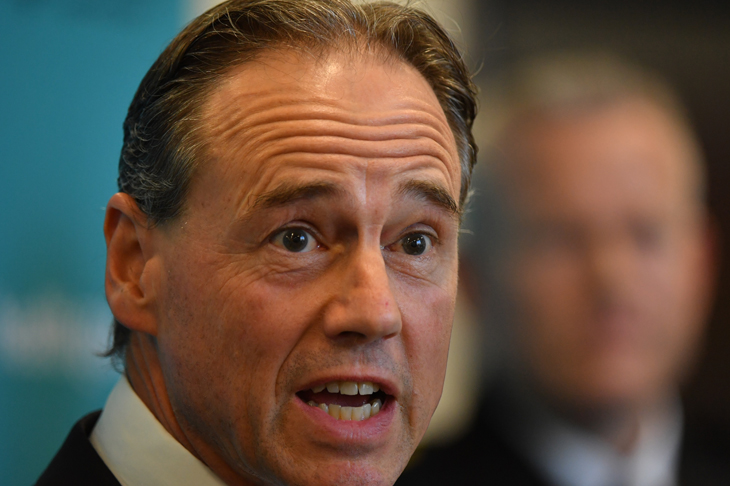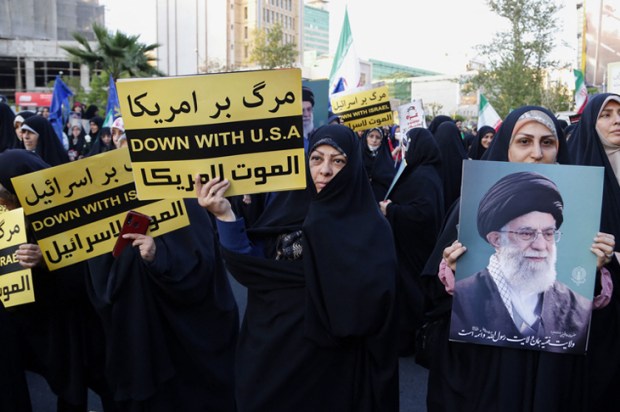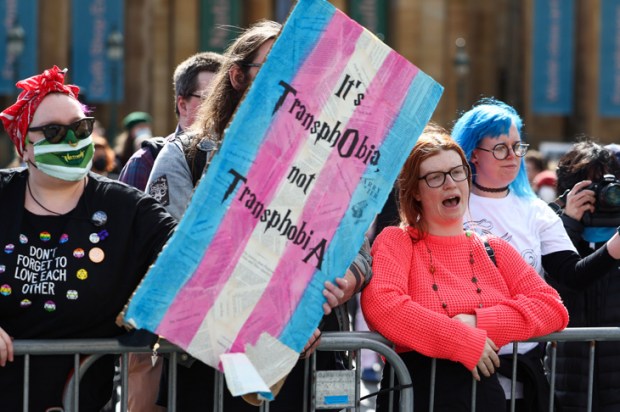‘The whole aim of practical politics is to keep the populace alarmed (and hence clamorous to be led to safety) by menacing it with an endless series of hobgoblins, all of them imaginary’, observed H.L. Mencken.
The latest hobgoblin to be wheeled out in Australia’s endless Covid horror movie is a wheezy young waif in a hospital bed. The ad, authorised by the federal government, is the latest instalment in the relentless campaign of Project Fear to terrorise people into huddling in their homes until they can be vaccinated.
If the ad was subject to the rules governing commercial businesses, the government might be prosecuted for misleading consumers. A study from Oxford University has shown that severe Covid in young people is largely explained by obesity and Covid deaths are overwhelmingly in the elderly. The only people to die since the NSW lockdown began are a man in his 70s and a woman in her 90s.
That hasn’t daunted NSW’s chief health officer Kerry Chant who made a point of saying, very slowly, that at least one teen and a couple of people in their 20s and 30s were in intensive care while being cagey about disclosing any co-morbidities.
Ramping up the fear factor Premier Gladys Berejiklian warned people not to browse in supermarket aisles or go shopping for inessential items such as shoes but has so far failed to demonstrate how irrelevant they are by turning up to a press conference unshod.
Yet for epidemiologist Tony Blakely it wasn’t enough. He said there were only three options; to let the virus rip, resulting in thousands of deaths and health services overwhelmed, the current ‘soft’ lockdown which he said would drag on for months, or a hard lockdown enforced by the military and a shutdown of all lingerie shops. Presumably, those resisting arrest in aisle six or discovered with a newly purchased pair of pumps and panties could be shot on sight.
Overlooked by almost everyone is the possibility that the pandemic could end with an effective treatment. If there were an outbreak of plague (which still exists in parts of the US and Africa) would the Australian government lock down the country because there’s no vaccine? Let’s hope not since there’s a perfectly effective antibiotic to treat the Black Death. When HIV emerged in the 1980s, there was no vaccine to prevent it. There still isn’t. Yet Aids-related deaths have been reduced by over 60 per cent, thanks largely to effective treatment.
The first essential element in responding to any pandemic is not a vaccine, which does nothing for people already infected, it is treatment. Indeed, an effective treatment reduces the circulation of a virus reducing the chances of mutations and makes a mass vaccination program safer and more effective.
It is to Australia’s credit that one of the most effective treatments was identified at Monash University along with the Doherty Institute which showed that ivermectin kills the Sars-CoV-2 virus within 48 hours. Yet to our national shame, the researchers have been starved of resources and the discovery ignored.
Not so in Indonesia where an enterprising philanthropist, Haryoseno, leapt into action and made ivermectin available to the masses for free or at low cost. As a result, Indonesia has had an extremely low Covid mortality rate. That is until the Ministry of Health decided, in line with the WHO’s recommendation, that ivermectin would only be used in a clinical trial. Haryoseno has been threatened with a fine and a ten-year jail sentence and the supply of ivermectin has dried up. Result? Deaths per million have increased five-fold since withdrawal of ivermectin on 12 June.
In Australia, one of the few doctors brave enough to use the drug to treat patients and save lives, Dr Mark Hobart, was reported to the Australian Health Practitioner Regulation Agency (AHPRA). Thankfully, AHPRA advised that there had been no infringement. Indeed, federal Health Minister Greg Hunt wrote to one of the doctors in Australia who prescribes ivermectin confirming that he was aware that some physicians are prescribing ivermectin off-label for Covid and that they were quite within their rights as the practice of prescribing registered medicines outside of their approved indications is not regulated or controlled by the Therapeutic Goods Administration (TGA), it is at the discretion of the prescribing physician. Yet the silence persists. Ivermectin is the drug that dare not speak its name.
Some doctors prescribing ivermectin are members of the Covid Medical Network. They can be contacted via their website and provide prescriptions for prophylaxis and treatment anywhere in the country (covidmedicalnetwork.com). Many follow the protocol established by world-renowned researcher Dr Thomas Borody who, largely at his own expense, has run a trial of an ivermectin triple therapy which has shown a reduction in mortality of 86 per cent in patients who were seriously ill with Covid. The only patients who died in the study – which has been published on preprint server medRxiv – were those that declined treatment.
Demonstrating the complete lack of urgency with which it treats repurposed drugs, the TGA last updated its advice on ivermectin on 1 June. It claims that there is currently insufficient evidence to support its safe and effective use. Yet since 1 June results of 15 new trials and meta-analyses of ivermectin have been published almost all showing steep declines in mortality. The question that the TGA has to answer is how is it possible to approve an experimental gene therapy vaccine with plummeting efficacy, significant short-term safety signals and unknown longterm side effects and yet not recommend a drug with an outstanding safety profile, which is supported by Nobel laureates and multiple randomised controlled trials?
On Wednesday, when Premier Berejiklian decided to lock down Greater Sydney for another two weeks only 24 people who had tested positive were in the community. In order to bring that to zero the lockdown is estimated to cost about $16 billion. Sydney’s new Northern Beaches hospital only cost about $2 billion. Covid has cost the Australian economy $311 billion or in our new Covid currency 156 hospitals.
It probably not a coincidence that it is NSW Treasurer Dominic Perrottet and federal Treasurer Josh Frydenberg who have suggested we to learn to live with the virus. Yet we don’t have to sacrifice lives or bankrupt the country. We only have to use an Australian treatment that will one day be recognised as the greatest medical discovery since penicillin.
Got something to add? Join the discussion and comment below.
Get 10 issues for just $10
Subscribe to The Spectator Australia today for the next 10 magazine issues, plus full online access, for just $10.
You might disagree with half of it, but you’ll enjoy reading all of it. Try your first month for free, then just $2 a week for the remainder of your first year.












Comments
Don't miss out
Join the conversation with other Spectator Australia readers. Subscribe to leave a comment.
SUBSCRIBEAlready a subscriber? Log in